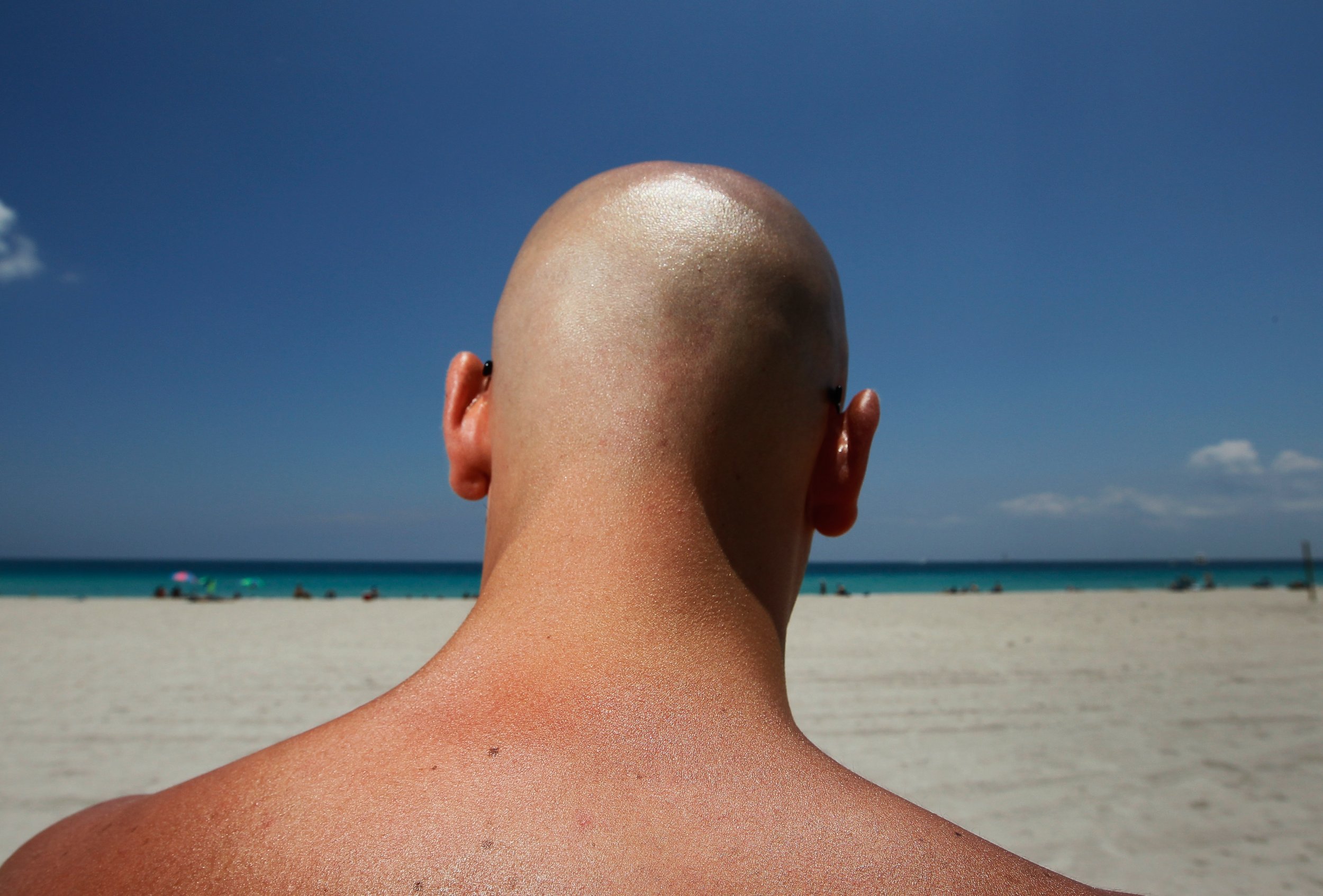
A man could reportedly make a dent in his forehead after a severe sunburn left his skin swollen. The man, identified as Cade Huckabay from Texas, said he shaved his head to see how it might look and then got "severely sunburned."
One time I shaved my head, got severely sunburned, & swelled up just a little bit :-) pic.twitter.com/9FWw3jcdYf
— Cade Huckabay (@CadeHuckabay) December 5, 2017
"At one point I could put a dent in my forehead and it would stay there for like half an hour," he tweeted. Further in his Twitter thread, he said that it "only hurt for a week or so" and that "Advil and ice got the job done."
Having this much swelling after a sunburn is extremely rare, Dr. Evan Rieder, a dermatologist at NYU Langone Health, told Newsweek. This particular case also looks a bit odd for a sunburn. "I guess I was expecting to see something different when I heard about this particular individual," he said. (Rieder did not examine Huckabay, he responded to the photograph posted on Twitter.) "I thought he was going to have a thick burn, where the skin was going to be blistering off and he was going to have an indentation as a result of that, but that's not what that looks like to me," he said.
"It looks like his skin is very edematous—it's full of fluid," he said. "It looks like the whole architecture of the skull may be swollen. It looks like he had a very exaggerated sunburn reaction."
Exaggerated sunburn reactions can happen if you're taking certain medications, Rieder noted. "There's a very, very long list of medications that can cause people to have these exaggerated photo-sensitive reactions," he said, including some blood pressure medications, ibuprofen, naproxen, some antihistamines, some antidepressants and some antibiotics.
This kind of swelling could have also indicated a skin infection; however, Rieder noted, that infection is also rare, the borders would normally have been better defined and the skin would have been broken somewhere.
The sun produces three different types of ultraviolent light; only two types, A and B, can get through the atmosphere. UV-B light is generally more responsible for sunburns, Rieder said. "The mechanisms of sunburn are somewhat incompletely understood," he said, but there are some basic things that scientists know happen after a person's skin gets too much UV light exposure. Blood vessels dilate, the body's inflammatory processes kick into gear, and some of the cells on the skin's surface may begin to die off. The redness associated with sunburns usually peaks within a day.
There are plenty of other nasty sun-related things that can happen to people, Rieder said, including polymorphous light eruption and solar urticaria. Both conditions result in extreme skin reactions to sun exposure, including rashes, hives and swelling.

If you find yourself with a bit of a swollen head after a sunburn, should you poke it? If the skin isn't broken, poke away. "I don't think there's very much damage that you're going to be doing," Rieder said. However, if you do have a cut or something similar, keep your hands off. "You should not be poking it or prodding it with anything," he said.
Avoiding sunburns—extreme or otherwise—requires applying a palm's worth of sunscreen at least 15 minutes before going outdoors to any exposed skin and reapplying regularly, according to the American Academy of Dermatology. If that fails, the Skin Cancer Foundation recommends treating a sunburn by cooling your skin with cold compresses, drinking plenty of water and taking ibuprofen or aspirin to help with any inflammation.
Uncommon Knowledge
Newsweek is committed to challenging conventional wisdom and finding connections in the search for common ground.
Newsweek is committed to challenging conventional wisdom and finding connections in the search for common ground.
About the writer
Kate Sheridan is a science writer. She's previously written for STAT, Hakai Magazine, the Montreal Gazette, and other digital and ... Read more
To read how Newsweek uses AI as a newsroom tool, Click here.








